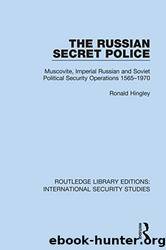The Russian Secret Police: Muscovite, Imperial Russian and Soviet Political Security Operations 1565â1970 by Ronald Hingley

Author:Ronald Hingley [Hingley, Ronald]
Language: eng
Format: epub
Tags: History, Military, General
ISBN: 9781000371352
Google: ARgoEAAAQBAJ
Publisher: Routledge
Published: 2021-05-30T05:00:00+00:00
9
The NKVD under Yagoda and Yezhov
1934-1938
The year 1934âmore precisely, its first eleven monthsâwitnessed a temporary check to the development of the Soviet political police as an instrument of terror. By now Stalinâs Russia seemed to have weathered the worst storms. Collectivisation of agriculture had been carried through, the OGPU was no longer arresting and shooting peasants in bulk, the great famine was over and adequate food stocks were to hand. Though the industrial aims of the First Five Year Plan had not all been attained, a comparatively modest second plan now held out the promise of a less hectic future. Meanwhile Hitlerâs rise to power in Germany was no hopeful sign for the Soviet Union, yet at least fostered a sense of solidarity among her citizens.
Meeting in Moscow from 26 January to 10 February 1934, the Seventeenth Party Congress emphasised the themes of unity, relaxation and hope. In many ways this âCongress of Victorsâ seemed to set the seal on Stalinâs establishment as supreme ruler. His vanquished rivals (Zinovyev, Kamenev, Pyatakov, Bukharin, Rykov and others) were permitted to take part, and to pay their master fulsome tributes which received a respectful hearingâno claque of Stalinists howled them down, as formerly. Now, it appeared, the Secretary-General could at last afford to be generous to his enemies. In his own report to the Congress he encouraged this impression, remarking that it had been necessary to finish off the remnants of opposition within the Party at the previous, Sixteenth Congress, but that âat the present Congress there is nothing [left] to proveâ.1 Adding his impression that there was ânobody left to beatâ, Stalin was perhaps exercising his grim sense of humour, ifâas seems likelyâhe had already marked down his own colleagues, followers and sycophants for extermination. From among 1,966 congressmen who now basked in the sunshine of their genial leaderâs smile, 1,108 were to be arrested and charged with counter-revolutionary crimes within the next few years.2
Meanwhile, however, Stalin still seemed far from achieving unquestioned power of life and death over Party members. On this issue he still had opponents in the Central Committee, while the Politburo itself contained three such comparative moderates in Kirov, Ordzhonikidze and Kuybyshev. Kirov was now the Partyâs rising star. He led its Leningrad branch, and thus possessed his own power base. He was also young, eloquent, good-looking and Russianâenjoying in all these respects an advantage over his pockmarked Georgian senior. At the Seventeenth Congress, moreover, Kirov received applause rivalling that accorded to Stalin himself. There was even a movementâhow influential can only be guessedâto remove Stalin and make Kirov leader in his place.3 In the elections to highest Party office held after the Congress, Kirov greatly strengthened his position when he was appointed to the powerful Central Committee Secretariat alongside Stalin, Kaganovich and Zhdanov. Stalin, on the other hand, suffered a rebuff, being re-elected as a mere âSecretaryâ, instead of âSecretary-Generalâ, as hitherto. Though no one could doubt his continuing pre-eminence, this change of title certainly represented an
Download
This site does not store any files on its server. We only index and link to content provided by other sites. Please contact the content providers to delete copyright contents if any and email us, we'll remove relevant links or contents immediately.
| Africa | Americas |
| Arctic & Antarctica | Asia |
| Australia & Oceania | Europe |
| Middle East | Russia |
| United States | World |
| Ancient Civilizations | Military |
| Historical Study & Educational Resources |
Magic and Divination in Early Islam by Emilie Savage-Smith;(1533)
Papillon by Henry Charrière(1430)
Bohemians, Bootleggers, Flappers, and Swells: The Best of Early Vanity Fair by Bohemians Bootleggers Flappers & Swells- The Best of Early Vanity Fair (epub)(1403)
Ambition and Desire: The Dangerous Life of Josephine Bonaparte by Kate Williams(1388)
Twelve Caesars by Mary Beard(1315)
Operation Vengeance: The Astonishing Aerial Ambush That Changed World War II by Dan Hampton(1162)
What Really Happened: The Death of Hitler by Robert J. Hutchinson(1161)
London in the Twentieth Century by Jerry White(1146)
The Japanese by Christopher Harding(1131)
Time of the Magicians by Wolfram Eilenberger(1126)
Twilight of the Gods by Ian W. Toll(1117)
Lenin: A Biography by Robert Service(1075)
The Devil You Know by Charles M. Blow(1024)
A Social History of the Media by Peter Burke & Peter Burke(976)
Freemasons for Dummies by Hodapp Christopher;(964)
Napolean Hill Collection by Napoleon Hill(942)
Henry III by David Carpenter;(919)
The Rise and Triumph of the Modern Self by Unknown(913)
Richard III (The English Monarchs Series) by Charles Ross(908)
